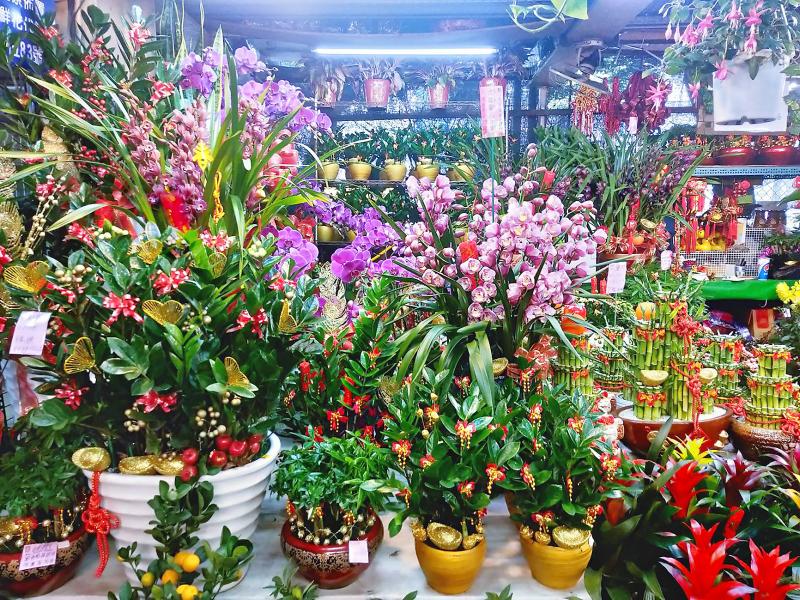From yesterday to Lunar New Year’s Eve on Thursday, the Taipei Flower Market is to remain open around the clock, in response to heightened demand ahead of the Lunar New Year holiday.
A special fair focused on local produce is also to be held at the market until Wednesday, highlighting products with the Certified Agricultural Standards, Taiwan Organic, and Taiwan Agriculture and Food Traceability labels, as well as those with the Taiwan agricultural production traceability QR code, Taipei Department of Economic Development Commissioner Lin Chung-chieh (林崇傑) said yesterday.
Hung Tzu-chieh (洪子傑), an official at the Taipei Flowers Auction Co’s planning division, said that the market could this year supply up to 1 million batches of cut flowers, thanks to warmer weather in the past few weeks.

Photo: New Taipei City Agriculture Bureau via CNA
About 30,000 potted flowers would be on sale on each of the days ahead of the holiday, up 10 to 30 percent from last year, Hung added.
Prices might be about 10 percent higher than in the past few weeks due to higher demand, he said.
To prevent the spread of COVID-19, all vendors, staff and visitors must wear masks, Hung said, adding that people should visit during off-peak hours to avoid crowding.
The Taipei Weekend Flower Market would additionally open from 9am to 8pm from today until Wednesday and from 9am to 5pm on Thursday, Hung added.
The Banciao Flower Market in New Taipei City is also to remain open longer ahead of the holiday: until 10pm from yesterday to Wednesday and until 8pm on Thursday, the New Taipei Agriculture Department said.
Banciao Flower Market director Lin Chien-hung (林建宏) said that there was no significant price increase this year, with prices for potted orchids at NT$300 to NT$400.
As many events scheduled for the Lunar New Year holiday have been canceled to prevent the spread of COVID-19, agriculture department commissioner Lee Wen (李玟) yesterday encouraged people to buy flowers to decorate their homes and support to the flower industry.
Additional reporting by Yang Hsin-hui

CARGO LOSS: About 50 containers at the stern of the ‘Ever Lunar’ cargo ship went overboard, prompting the temporary closure of the port and disrupting operations Evergreen Marine Corp, Taiwan’s largest container shipper, yesterday said that all crew members aboard the Ever Lunar (長月) were safe after dozens of containers fell overboard off the coast of Peru the previous day. The incident occurred at 9:40am on Friday as the Ever Lunar was anchored and waiting to enter the Port of Callao when it suddenly experienced severe rolling, Evergreen said in a statement. The rolling, which caused the containers to fall, might have been caused by factors including a tsunami triggered by an earthquake in Russia, poor winter sea conditions in South America or a sudden influx of waves,

The Ministry of Culture yesterday officially launched the “We TAIWAN” cultural program on Osaka’s Nakanoshima sandbank, with the program’s mascot receiving overwhelming popularity. The cultural program, which runs from Aug. 2 to 20, was designed to partner with and capitalize on the 2025 World Expo that is being held in Osaka, Japan, from April 13 to Oct. 13, the ministry said. On the first day of the cultural program, its mascot, a green creature named “a-We,” proved to be extremely popular, as its merch was immediately in high demand. Long lines formed yesterday for the opening

The Taipei Summer Festival is to begin tomorrow at Dadaocheng Wharf (大稻埕), featuring four themed firework shows and five live music performances throughout the month, the Taipei Department of Information and Tourism said today. The festival in the city’s Datong District (大同) is to run until Aug. 30, holding firework displays on Wednesdays and the final Saturday of the event. The first show is scheduled for tomorrow, followed by Aug. 13, 20 and 30. To celebrate the 30th anniversary of Disney Pixar's movie Toy Story, the festival has partnered with Walt Disney Co (Taiwan) to host a special themed area on

BE CAREFUL: The virus rarely causes severe illness or death, but newborns, older people and those with medical conditions are at risk of more severe illness As more than 7,000 cases of chikungunya fever have been reported in China’s Guangdong Province this year, including 2,892 new cases last week, the Centers for Disease Control (CDC) yesterday said it is monitoring the situation and considering raising the travel notice level, which might be announced today. The CDC issued a level 1 travel notice, or “watch,” for Guangdong Province on July 22, citing an outbreak in Foshan, a manufacturing hub in the south of the province, that was reported early last month. Between July 27 and Saturday, the province reported 2,892 new cases of chikungunya, reaching a total of 7,716